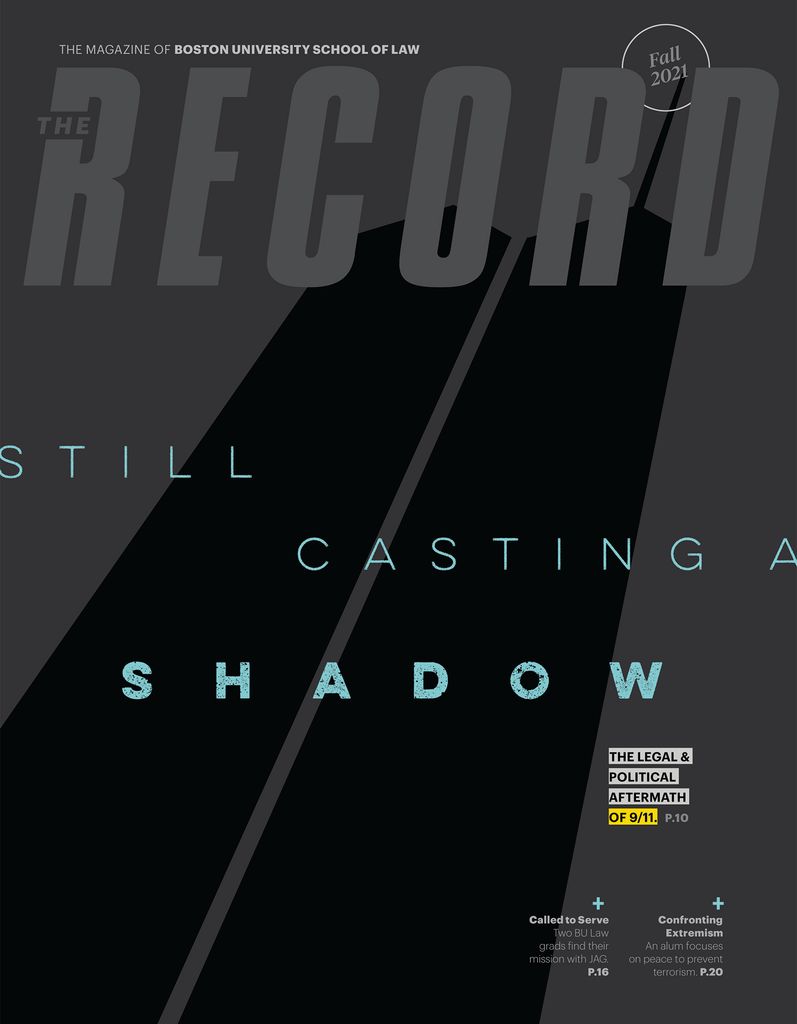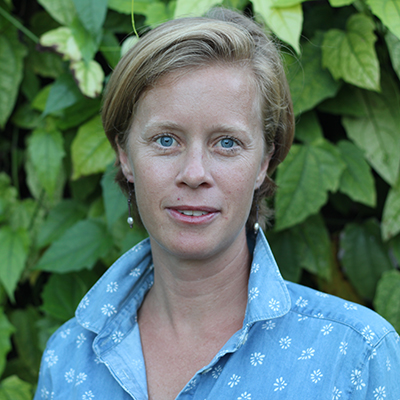Still Casting A Shadow
Two decades after the devastating terror attacks of September 11, 2001, the United States is still grappling with how to balance civil liberties and national security.

By Rebecca Beyer
Still Casting A Shadow
TWO DECADES AFTER THE DEVASTATING TERROR ATTACKS OF SEPTEMBER 11, 2001, THE UNITED STATES IS STILL GRAPPLING WITH HOW TO BALANCE CIVIL LIBERTIES AND NATIONAL SECURITY.
After the terrorist attacks of September 2001, Catherine Mitrano (CAS’89, LAW’89) was among a select group of federal attorneys tasked with creating the newly authorized US Department of Homeland Security (DHS), a cabinet-level entity that consolidated all or part of nearly two dozen autonomous agencies, including US Customs, the Transportation Security Administration, the Secret Service, and the Department of Agriculture.
It was a massive undertaking, described in the press as the largest reorganization of the federal government since the Department of Defense’s formation in 1947.
And it took less than a month. After Congress passed the Homeland Security Act in November 2002, the actual work of creating the agency began. Mitrano’s first detail—or temporary assignment—from the US Coast Guard, where she worked on everything from labor and employment issues to administrative law matters, started on December 30, 2002. DHS began operating on January 24. Mitrano’s detail was extended again and again and again. She never went back to the coast guard.

(CAS’89, LAW’89)
That something so huge could happen so fast was nothing short of a bureaucratic miracle, she says.
“The federal government moved like it had never moved at any time before that date, and it hasn’t moved like that at any time since,” she says. “It was remarkable.”
Indeed, changes in response to 9/11 came quickly. But what is most remarkable about those changes is how permanent they have become. In the name of security, the United States strengthened its borders, its surveillance capabilities, and the power of its presidency. Looking back on two decades of post–9/11 policies, Mitrano and a trio of Boston University School of Law professors reflect on the impact those changes have had on the United States and its people.
Streamlining US Security
DHS was created, in part, to streamline communication-sharing between intelligence and law enforcement agencies.
“There were threats throughout the summer leading up to 9/11 that many organizations knew part of, but no one had the whole picture,” Mitrano explains. “Once that picture was synthesized, it was very clear that our level of readiness should have been at a higher state.”
DHS was designed to house all the components of homeland security in one place. Among other accomplishments, it entered into agreements to screen cargo containers bound for the US, identified critical infrastructure protection roles, and expanded its computer-based counterterrorism communication network across the country.
“The day before 9/11, our biggest security threat was not terrorism; it was cybersecurity. [And today,] our main security threat is cybersecurity…”
—AHMED GHAPPOUR
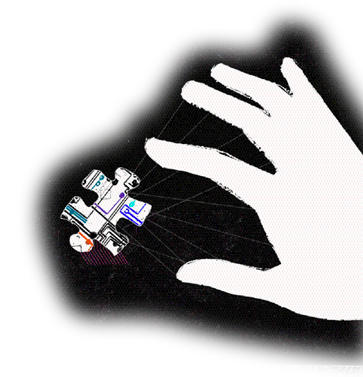
“We needed to have some sort of single point of accountability,” Mitrano says. “The federal government has become more nimble as a whole in responding to crosscutting challenges, whatever they may be.”
According to Associate Professor AHMED GHAPPOUR, however, one irony of the response to 9/11 is that, in an effort to keep people safe from hijacked planes and bombs, the United States has arguably made itself more vulnerable to a potentially even more pressing threat: cyberattacks.
“The day before 9/11, our biggest security threat was not terrorism; it was cybersecurity,” Ghappour says. And today, “our main security threat is cybersecurity, especially given our dependence on data, our interconnectivity, and the artificial intelligence that’s being injected everywhere. All of these things are subject to hacking. All of these things will necessarily be made more vulnerable in a mass surveillance state.”
Ghappour’s personal and professional life were forever altered by 9/11. That day, he was scheduled to have his US citizenship interview in New Jersey. He drove his sister to her company’s Morristown location and then heard on Howard Stern’s (CGS’74, COM’76) radio show that a plane had flown into the World Trade Center building where she normally worked. The siblings’ mother, who worked near the towers, had to evacuate the area. When she finally called her children, it wasn’t to let them know she was safe; it was to ask if Ghappour had made his interview. She was already anticipating a harder life ahead for their family, which is of Egyptian descent.
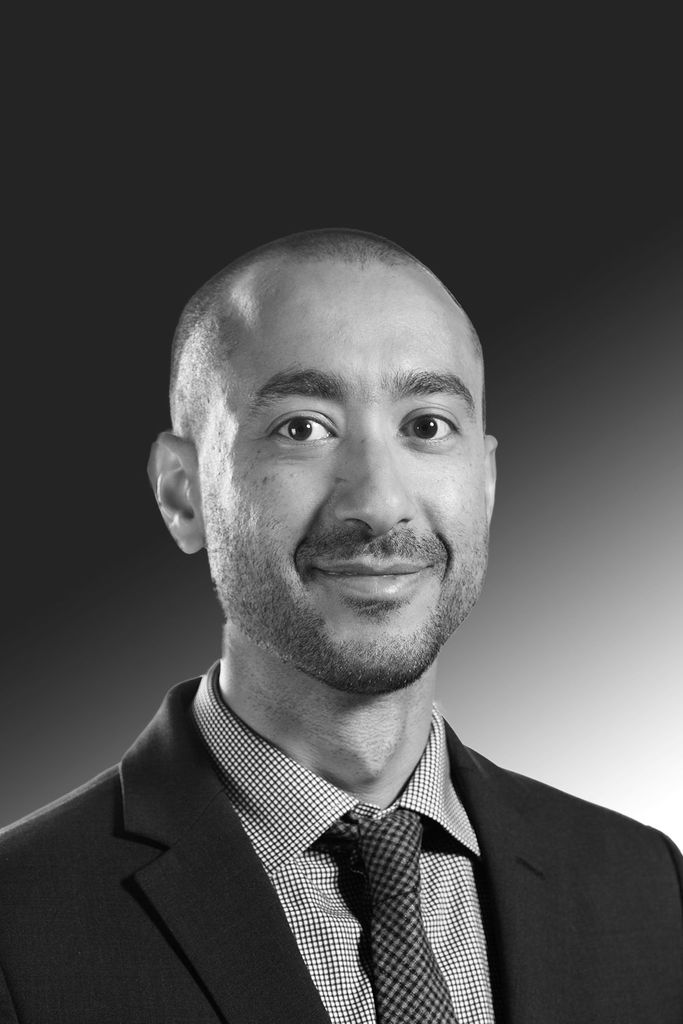
BU LAW ASSOCIATE PROFESSOR
“She was like, ‘Go swear in right now!’” Ghappour remembers. “It’s not like Arab Americans and Muslim Americans were strangers to racism.”
The 9/11 attacks and the resulting “war on terror” led Ghappour to the law. In 2004, he left his job as an engineer at a technology company in the Bay Area to attend law school. While an associate at Orrick, he worked on a pro bono case involving a Yemeni detainee at Guantánamo Bay. From there, he took a job as an attorney at Reprieve UK, resettling former inmates of the military prison. Next, he joined a civil rights and criminal defense firm in Seattle. Over the years, he represented more than 40 Guantánamo Bay prisoners, none of whom had any ties to the attacks of 9/11, which was the justification for opening the prison in the first place.
Ghappour says one of the most drastic post–9/11 shifts in the always-precarious balance between national security and civil liberties was the creation of the warrantless TERRORIST SURVEILLANCE PROGRAM (TSP).
“The TSP was a temporary sort of surge on surveillance that became permanent over time,” he says. “This is systematic surveillance by certain topics or selectors. There’s a huge difference between surveilling associates of Bin Laden and capturing the communications of people who type the words ‘Bin Laden’ into a search engine.”
Ghappour says the potential for civil liberties to be “usurped in the cybersecurity space” is huge.
“That’s just the nature of securing computers,” he says. “It’s so much more data-intensive than anyone can imagine, and most people don’t understand the actual issues involved or their magnitude because of the technical complexity.”
Take the No Fly List created after 9/11, which the American Civil Liberties Union (ACLU) and other civil rights organizations have challenged for years. Being stopped at the airport and prevented from boarding a plane is a tangible harm, whereas someone might not even be aware of how their actions are being thwarted or manipulated online.
Battle at the Borders
Another area that changed dramatically after 9/11 is immigration law. In the days and months before the attacks, President GEORGE W. BUSH was advocating for bipartisan immigration reforms that seem almost impossible to imagine today: a temporary worker program, the Dream Act, and a process by which most unauthorized immigrants could obtain lawful permanent residence status without leaving the country. On September 6, 2001, Bush and Mexican President Vicente Fox pledged to complete a deal between their countries by the end of that year.
Five days later, everything changed.
“We became a country that sees enforcement and detention as the default,” says Clinical Associate Professor SARAH SHERMAN-STOKES, associate director of the Immigrants’ Rights & Human Trafficking Program, who was a first-year college student in 2001.
In place of reform came retaliation. One example: the NATIONAL SECURITY ENTRY-EXIT REGISTRATION SYSTEM, known as NSEERS, created in 2002. The program required men over the age of 16 from 25 countries—most of which were predominantly Muslim—to be fingerprinted and photographed upon arrival and to report to US immigration officials every 12 months thereafter.
“It was a deeply discriminatory policy couched in counterterrorism terms,” Sherman-Stokes says. “And understandably, it completely eroded any trust Muslim Americans may have had in the government.”
The Department of Homeland Security removed the designated countries from the NSEERS program in 2011 and dismantled the regulations entirely in 2016, calling them “redundant” and “obsolete.”

BU LAW CLINICAL ASSOCIATE PROFESSOR
But the problem with implementing such processes in the first place is that they seem to pave the way for similarly discriminatory processes. When he took office, President Donald Trump considered a Muslim registration system; instead, he issued a ban on travel from predominantly Muslim countries.
“People say, ‘How could this happen here?’” says Sherman-Stokes, rattling off a list of other racist and xenophobic US policies, including the internment of Japanese Americans during World War II and the practice of forcing Native American children off reservations and into boarding schools where many faced abuse and all were prohibited even from speaking their own languages. “The answer is: of course this can happen here. Institutionalized racism and xenophobia were always baked into US immigration law but were reinvigorated after 9/11.”
Precedent for a Powerful President
In other words, in many ways, 9/11 was a precipitating event for ideas and beliefs long held, already underway, or lying dangerously dormant in the United States.
Professor ROBERT TSAI, who was working at the ACLU in 2001 and has written recently about the impact of 9/11 on US policy and politics, says one trend accelerated by 9/11 was the expansion of the US executive branch.
The presidency was “supposed to be a restrained office,” Tsai says. But, over time, “average Americans began to look to the president as the primary constitutional actor who will keep the country safe.”
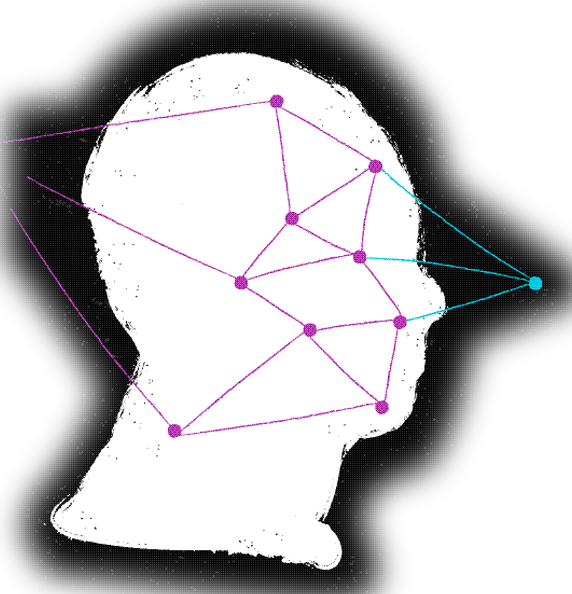
Encouraging that view have been scholars who argue for a so-called unitary executive. When some of those scholars joined the Bush administration, those theories were put into practice, leading to the Terrorist Surveillance Program, Guantánamo Bay, and an expanded use of extraordinary rendition—the process by which a government takes a person from one country to another to circumvent laws on torture, detention, or interrogation.
“They created this legal infrastructure that allowed the government to broadly reconsider constitutional commitments to privacy and of course bodily integrity and speech,” says Tsai. “Part of that trend has sidelined Congress as the place where these conversations are supposed to be happening.”
In “Manufactured Emergencies,” a 2020 Yale Law Journal article, Tsai argues a unitary executive makes the US people vulnerable to manipulation, including the creation of a constant state of crisis to justify governance outside democratic norms.
“In that environment, it’s very easy to assert power and have no accountability,” Tsai says.
Once established, unitary power is also hard to relinquish. Tsai points out that although President Barack Obama took some steps to reverse his predecessor’s “war on terror” policies, he likewise embraced an expansive view of his office, including by legitimizing drone strikes without Congressional authorization.
“If you believe somebody has dignity, you’re saying they should be treated as an equal member of our community,” Tsai explains. “But when they’re finding ways to justify things like grabbing people in foreign countries for extraordinary rendition, there’s no equality, no dignity, no fairness.”
A Societal Dilemma

BU LAW PROFESSOR
Of course, the burdens of increased surveillance and detention have been borne almost entirely by communities of color in this country, which may be one reason people in power have looked the other way as civil liberties have taken a backseat to security concerns. But now that the Biden administration has stepped up funding and resources to prevent domestic extremism in this country, including by white supremacists, that may change.
White males “are a very enfranchised group of people in the United States,” Ghappour says. “There might be more hesitancy to undermine civil liberties now.”
Mitrano was on guard against the potential abuse of government power during her time at DHS and has been throughout her career.
“My mother is Japanese,” she says. “My father was a serviceman. Growing up, I became entranced by stories about the internment of people who looked like myself after World War II. How horrible is it that someone could just label me not-American.”
“Institutionalized racism and xenophobia were always baked into US immigration law but were reinvigorated after 9/11.”
—SARAH SHERMAN-STOKES
DHS oversees or oversaw some of the post–9/11 policies that faced criticism from civil liberties and human rights advocates, including aspects of the ban on travel from Muslim countries and the No Fly List. Other policies took place outside the agency’s realm: the FBI, which is not part of DHS, conducted an extensive surveillance campaign among Muslim American communities; and neither the CIA, which led extraordinary rendition, or the National Security Agency, which created the TPS, are under DHS’ control.
One of Mitrano’s initiatives at DHS was establishing the agency’s OFFICE FOR CIVIL RIGHTS AND CIVIL LIBERTIES, which is charged with advocating for people’s rights and investigating complaints filed by the public.
“I had a personal motivation in making sure we did right by that part of the legislation, giving it the autonomy it needed,” she says. “We were very focused on that in the early days.”
Now senior counsel to the general counsel at the US Department of Veterans Affairs, Mitrano says DHS “on balance does more good than bad.”
“Where you stand on an issue depends on where you sit,” she says. “On the one hand, it’s good to have all the information in one place. On the other hand, information is only wonderful if it’s used for good. Overall, our country is safer, but there’s got to be a way to mitigate second- and third-order harms that come from amassing that much information and authority.”
Because priorities change at least as often as presidential administrations, Mitrano says the public must do the real work on these issues.
“Administrations are a reflection of society,” she says. “If society is in a protectionist mode, an agency will be used in that mode; if it’s in a more expansionist mode, it will support those ends as well. These are questions for society to ask itself. What do we prioritize? Ultimately, that’s what the law will reflect.”

